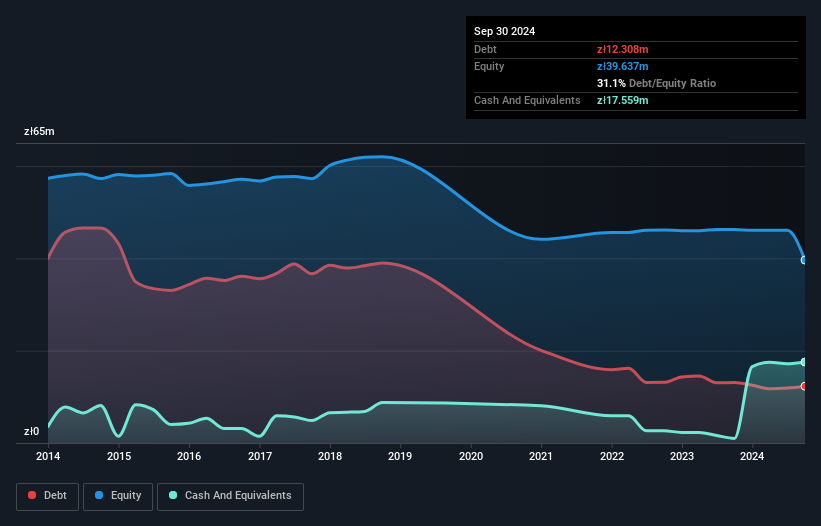
The external fund manager backed by Berkshire Hathaway's Charlie Munger, Li Lu, makes no bones about it when he says 'The biggest investment risk is not the volatility of prices, but whether you will suffer a permanent loss of capital.' So it seems the smart money knows that debt - which is usually involved in bankruptcies - is a very important factor, when you assess how risky a company is. Importantly, Mera S.A. (WSE:MER) does carry debt. But the more important question is: how much risk is that debt creating?
Why Does Debt Bring Risk?
Generally speaking, debt only becomes a real problem when a company can't easily pay it off, either by raising capital or with its own cash flow. In the worst case scenario, a company can go bankrupt if it cannot pay its creditors. However, a more common (but still painful) scenario is that it has to raise new equity capital at a low price, thus permanently diluting shareholders. By replacing dilution, though, debt can be an extremely good tool for businesses that need capital to invest in growth at high rates of return. When we examine debt levels, we first consider both cash and debt levels, together.
Check out our latest analysis for Mera
What Is Mera's Net Debt?
As you can see below, Mera had zł12.3m of debt at September 2024, down from zł13.1m a year prior. But on the other hand it also has zł17.6m in cash, leading to a zł5.25m net cash position.

How Healthy Is Mera's Balance Sheet?
The latest balance sheet data shows that Mera had liabilities of zł7.23m due within a year, and liabilities of zł13.0m falling due after that. On the other hand, it had cash of zł17.6m and zł10.3m worth of receivables due within a year. So it can boast zł7.62m more liquid assets than total liabilities.
This surplus strongly suggests that Mera has a rock-solid balance sheet (and the debt is of no concern whatsoever). On this view, lenders should feel as safe as the beloved of a black-belt karate master. Succinctly put, Mera boasts net cash, so it's fair to say it does not have a heavy debt load! The balance sheet is clearly the area to focus on when you are analysing debt. But it is Mera's earnings that will influence how the balance sheet holds up in the future. So if you're keen to discover more about its earnings, it might be worth checking out this graph of its long term earnings trend.
In the last year Mera had a loss before interest and tax, and actually shrunk its revenue by 8.7%, to zł19m. That's not what we would hope to see.
So How Risky Is Mera?
Statistically speaking companies that lose money are riskier than those that make money. And we do note that Mera had an earnings before interest and tax (EBIT) loss, over the last year. And over the same period it saw negative free cash outflow of zł208k and booked a zł6.6m accounting loss. Given it only has net cash of zł5.25m, the company may need to raise more capital if it doesn't reach break-even soon. Even though its balance sheet seems sufficiently liquid, debt always makes us a little nervous if a company doesn't produce free cash flow regularly. When analysing debt levels, the balance sheet is the obvious place to start. However, not all investment risk resides within the balance sheet - far from it. Be aware that Mera is showing 4 warning signs in our investment analysis , and 2 of those are a bit concerning...
When all is said and done, sometimes its easier to focus on companies that don't even need debt. Readers can access a list of growth stocks with zero net debt 100% free, right now.
New: Manage All Your Stock Portfolios in One Place
We've created the ultimate portfolio companion for stock investors, and it's free.
• Connect an unlimited number of Portfolios and see your total in one currency
• Be alerted to new Warning Signs or Risks via email or mobile
• Track the Fair Value of your stocks
Have feedback on this article? Concerned about the content? Get in touch with us directly. Alternatively, email editorial-team (at) simplywallst.com.
This article by Simply Wall St is general in nature. We provide commentary based on historical data and analyst forecasts only using an unbiased methodology and our articles are not intended to be financial advice. It does not constitute a recommendation to buy or sell any stock, and does not take account of your objectives, or your financial situation. We aim to bring you long-term focused analysis driven by fundamental data. Note that our analysis may not factor in the latest price-sensitive company announcements or qualitative material. Simply Wall St has no position in any stocks mentioned.
About WSE:MER
Adequate balance sheet slight.
Market Insights
Community Narratives




